
Alicia Cahuiya: “Let us live as Waorani!”
GABRIELA RUÍZ
(ECUADOR)
This Waorani leader has spent 30 years fighting the oil capitals, which invade and pollute Yasuní park, one of the most biodiverse places in the world as well as having the largest oil reserves in Ecuador. Given the announcement by President Guillermo Lasso to expand hydrocarbon production, Alicia’s demands are more topical than ever. The threat to the lives of the Waoranis and other indigenous peoples is intensifying.
Alicia Cahuiya took the podium at the National Assembly of Ecuador. Her words as a Waorani woman rang out among the murals where laws are made for the colonial and paradoxical homeland. She had come from Yasuní with a group of indigenous people ostensibly to support the exploitation of hydrocarbons in their ancestral territory but was determined not to keep to the script.
“There are seven oil companies operating in Waorani territory, which comprises four provinces. What benefits have we received? We are even poorer than before! (…) The indigenous people who inhabit the rainforest are not the problem. We want the territory to be respected. (…) Governments keep dividing it: the intangible zone, Yasuní park. Where are we administering the Waorani?”
This is what Alicia, an indigenous leader of the Ecuadorian Amazon, declared on October 4, 2013. She wore a snake, the symbol of wisdom, painted on each cheek. Two skeins with light and dark thread crossed her chest, adorned with a large seed necklace and a long red feather was attached to her headband.
“You must all say ‘yes’,” the president of the Waorani Nationality of Ecuador (Nawe), Moi Enomenga, had asked the grassroots indigenous group, before beginning to address the National Assembly of Ecuador. Alicia remembers that he was dressed as “great lord” and was wearing a stolen crown.
Community landowners were summoned to the debate in the legislative branch under false pretenses to approve the bill that would authorize the exploitation of Block 31 and Block 43 in Yasuní National Park. One of the most biodiverse places on earth, it is home to the Kichwa, Shuar, Waorani and isolated peoples such as the Tagaeri and Taromenane.
Representatives of former President Rafael Correa (2007-2017) pressured Alicia and other Waoranis through the co-opted leadership. They were all transported from their communities at the convenience of the government.
It did not seem to bother the assembly members that passage of this bill would result in the depredation of the Amazon forest and damage the integrity of peoples such as the Kichwa of Sarayaku, Sapara or isolated peoples such as the Tagaeri-Taromenane.
Enomenga warned: “Alicia, you are seriously out of line. When you get to the community, your brothers are going to kill you.” The Waoranis call each other brothers. The idea that her own people might hurt her made Alicia very sad.
She was scared and anxious, fearing for her life and that of her family. Soon afterwards, unknown people entered a room in the city of Puyo, for which she paid a small rent, as she was leaving the rainforest.
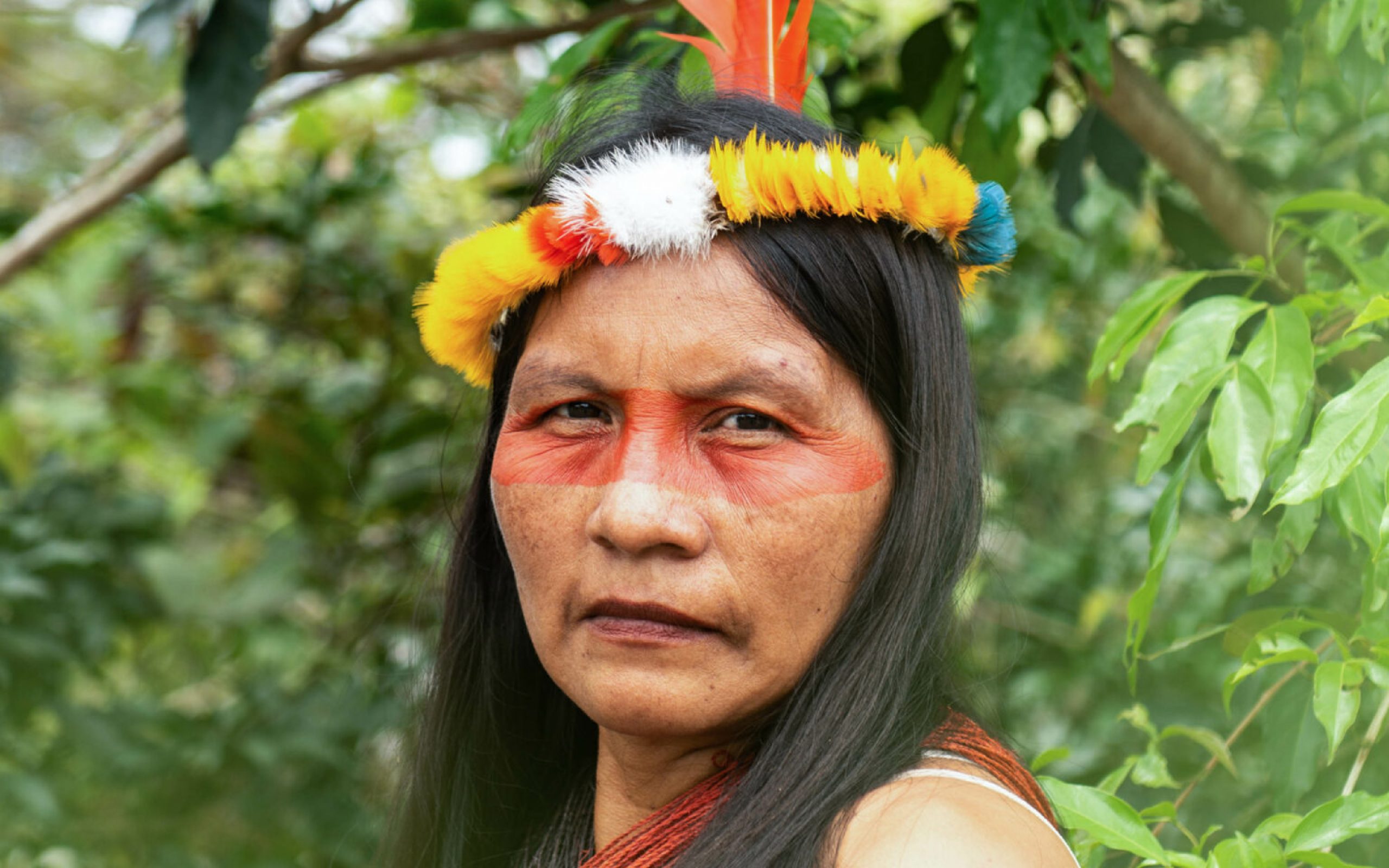
Photo: Portrait of Alicia Cahuiya for the report “The contacts of isolated peoples,” (2021) published by Carolina Zambrano.
That night, she fell asleep in the loft into which she had climbed on a ladder. When the intruders broke in, they did not see her. They stole her computer, phone, and camera after poisoning the dog that was guarding the entrance to the house and left a piece of paper that said: “Watch your step; you could die.” Alicia still wonders what would have happened if they had found her downstairs.
Despite these threats, Alicia continued to work for the Waorani and other peoples. In 2013, she was summoned as a witness at the Inter-American Commission on Human Rights (IACHR) to talk about the status of the isolated Tagaeri-Taromenane peoples, affected by development projects in strategic sectors that devastate natural resources and ways of life. And since 2018, she has coordinated the Isolated Indigenous Peoples Program of the Land is Life Organization.
The actions and protests of the indigenous people failed to stop the petroleum exploration. After the popular consultation of 2018 to protect Yasuní, the government of Lenín Moreno (2017-2021) did not comply with the mandate of the Ecuadorian people. It authorized the construction of drilling rigs and hydrocarbon production in Block 43 (ITT) that affected isolated peoples and Waorani territory.
In this context, in 2019, the Waorani people won the legal ruling in national courts to respect the right to prior, free, and informed consultation, enshrined in Article 57 of the Political Constitution of the Ecuadorian State. Nevertheless, the government went ahead with its plans.
Pressure from the government and oil companies has been so strong at various times that it has enabled them to promote unfair contracts. For example, in 2001, Agip Oil company earned millions of dollars, produced in Block 10, while the community only received a sack of rice, a sack of sugar, two buckets of lard, a bag of salt, two soccer balls, a whistle for the referee and a stopwatch.
But the consequences affect the territory. In the heart of the Yasuní Biosphere Reserve, the damage is evident: the Manduro River registers twice as many hydrocarbons (0.6 mg/1) as those allowed by the European Union for bathing water and sixty times more than what is approved for domestic drinking water. At the same time, 447 burners burn liquefied petroleum gas (LPG) in the open air. And a few months ago, the Waorani Dikapare commune, located in Block 55, in the province of Orellana, was militarized to protect the operations of Ecuaservoil oil company.
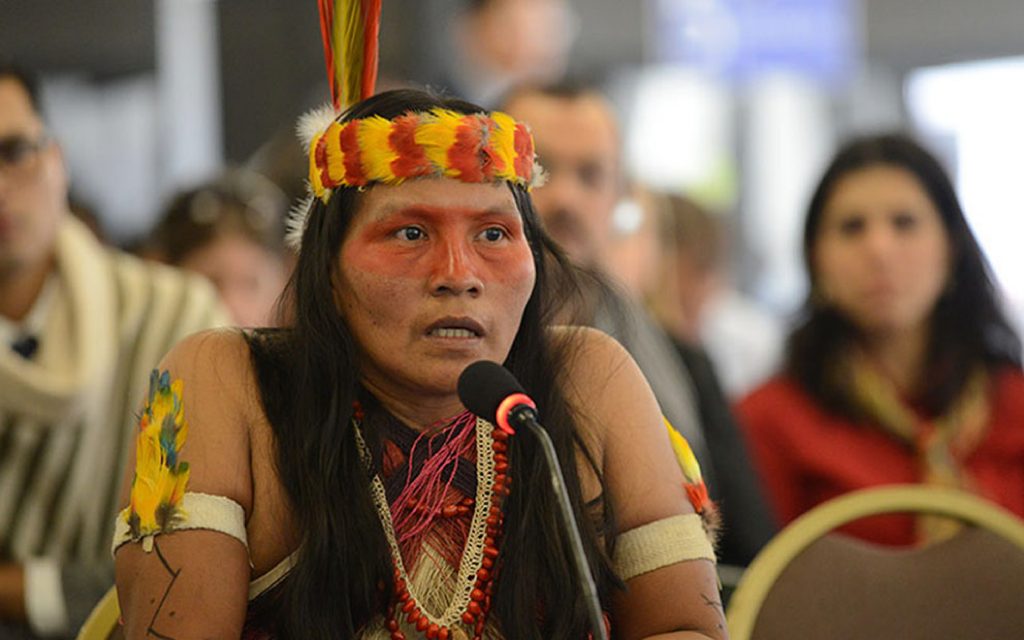
Photo: Inter-American Commission on Human Rights (2015).
Alice’s long walk
I met Alicia in 2017 in Pacayacu, during a peaceful protest she joined to complain to Petroecuador about the contamination of water wells in Sucumbíos province. The day before, I had had a dream presaging her bravery. I saw her as a girl inside a black cage hanging inside the tree. In my dream, she was fearless, just as she is in real life. A year later, she marched on “International Women’s Day” with the Amazonian Women’s Collective to demand the fulfillment of her mandate in the leadership.
For four years, at various times, I saw her walking barefoot in the streets of Quito and attending press conferences and appearances. Her red and yellow feather headbands, wayruros on her wrists and knees for protection, and traditional clothing woven from chambira palm fibers make her easy to identify at all the forums in which she participates.
She wears her trademark red eye mask, painted with annatto, when she speaks to indigenous leaders, presidents, journalists, environmentalists, and international forums; her long black hair cascades down her back.
She is 1.55 meters tall. At 46, she has the strength of a river. She goes from Ñoneno to Quito and back and then to Shell—her community—between walks, and canoe and bus trips.
Photo: Alicia Cahuiya smiles during a recreational activity. She participates in the Workshop for Indigenous Defenders in Bogotá (2019). Land is Life
She takes on oil companies and political power with a pride inspired by the legacy of her ancestors, the inhabitants of Yasuní. This is the only legacy for her five children, grandchildren, and the world.
Her grandmother Waare used to call her “Weya,” meaning “Guardian of the Waterfall” and showed her how to use plants. She taught her to go to the hills, prepare arrows, make handicrafts, and look after the farm. His grandfather Iteca was a highly respected warrior who fought against the rubber tappers. They murdered him and his body was buried according to the traditional ritual in the middle of Yasuní.
Waare wept as she recalled Iteca but had nowhere to honor his memory, because his grave was destroyed by the oil companies’ machinery. The Waorani were left without kewencores—places of fighting for territorial defense—and the graves of their grandparents when the government authorized miles of roads and pipelines to be laid in the rainforest.
When Alicia realized that her grandmother’s tears foreshadowed the pain of future generations, she felt a great fire in her heart. In the 2000s, she decided to find a way to make her voice heard. She organized with other women, improved her Spanish, and traveled to Quito more frequently to tell a story that contradicts the oil boom discourse.
Previously, oil infrastructure works had caused the forced displacement of the Waoranis. It was not the only policy that affected them. In the 1970s, the government and oil companies such as Texaco-Gulf set up the Summer Institute of Linguistics (SIL) to serve as a community mediator.
Under the guise of evangelizing and educating the Waorani, the government, oil companies and SIL began to forcibly relocate indigenous people into the “Protectorate” of Tiweno to vacate the land. The Ecuadorian State was thereby able to offer “vacant” land to oil companies, expropriating collective land for the “public interest.”
The traces and memory of Alicia Cahuiya’s ancestors have been erased by public hydrocarbon policies. So, she and other Waorani are engaged in resistance. They know that oil continues to devastate their territory and that without the rainforest, they could disappear.
Taking the spear
Oil brought other problems to indigenous territories: logging, mining, hydroelectric plants, alcoholism, violence, and prostitution. Some Waorani leaders signed agreements with oil companies for the exploitation of their ancestral territory. While the women were relegated to domestic chores, the men—employed by the oil companies—learned Spanish and other people’s customs. They earned money but did not provide clothes or food for their children.
“(The men) left those meetings with the leaders or with the oil companies and came home drunk to beat their wives. “I wondered what we could do to stop this,” explains Alicia, who also suffered abuse.
And so, the Waorani Women’s Association of the Ecuadorian Amazon (Amwae) was established to create jobs and financial autonomy; strengthen women’s businesses and make their political presence visible.
Alicia says that what is needed in the rainforest is not dollars, but hard work to take care of the land, and that the insertion of the logic of the consumer market has modified the relationship between the Waorani and the rainforest. ”If it were only a question of money, my children would not know the rainforest,” she says.
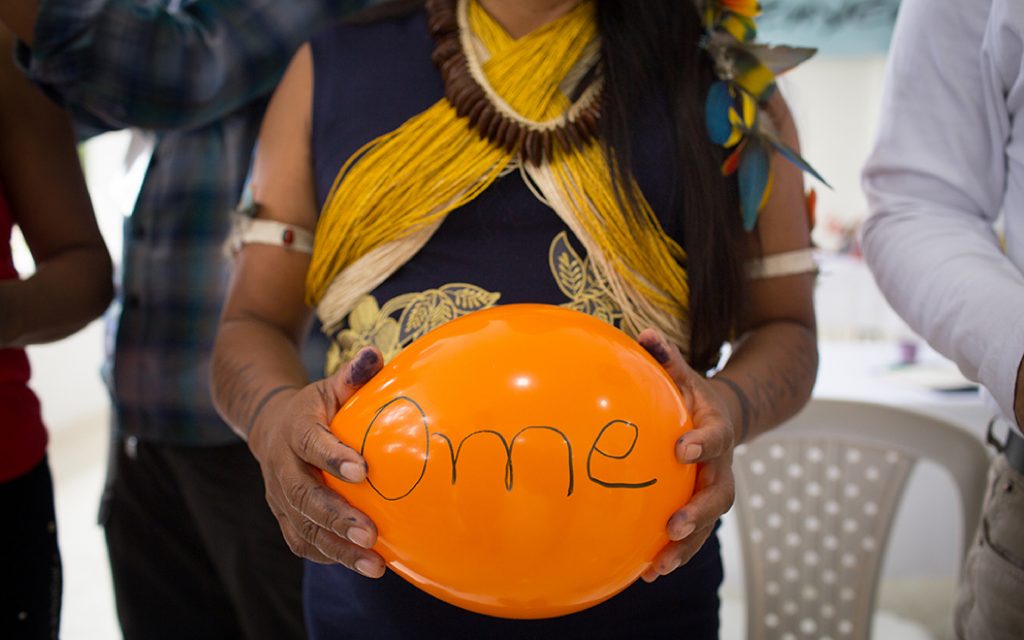
Photo: “Ome” means “I” in Waorani. Workshop for indigenous defenders held in Bogotá. (2019). Land is Life.
Alicia’s struggle, like that of other organized Waorani women, began at home. She confronted her father, who had worked for the oil companies all his life and still defends them, and then she had to deal with her husband.
Historically, marriage was used by the Waorani to prevent wars, unite clans, and reinforce the peacemaking role of women. The penalty for breaking this promise is death. Alicia was 12 when she was forced to marry Nanto at Shell. Earlier, she had been promised to the son of a powerful Yasuní shaman, but the adults chose her current husband.
”You have to arrive at a specific time or stay home,” said Nanto, when Alicia took over the leadership. But she had to perform her tasks: traveling and organizing her people while at home there were complaints and jealousy.
Even her husband—who was also a community leader—asked her, at one point, to accept the oil company in Yasuní. Alicia refused.
Although the Waorani do not allow women to touch their weapons, because they consider it to be bad luck, one day Alicia took Nanto’s spear, hunting monkeys and tapirs on her own.
Over time, Nanto also learned to look after their four daughters and son while his wife worked as a politician.
Victory in Cotopaxi
The summer of 2021 marked a milestone in Alicia’s political career. She was elected as the head of Women and Family in the Confederation of Indigenous Nationalities of Ecuador (Conaie), one of the organizations with the greatest impact in both the country and the region. She thereby became the first Waorani woman elected to the highest office in a body of national indigenous political representation.
During his inaugural speech, the new president of Conaie, Leonidas Iza, declared: “We must strengthen indigenous justice in our communities because of the levels of violence our female colleagues are suffering.”
Over 30 years after the “first indigenous uprising” in 1990, Alicia’s election is the result of political processes involving local and community leadership, her personal history and that of other indigenous female leaders such as Tránsito Amaguaña and Dolores Cacuango.
As Alicia recalls, that march was her first visit to Quito, accompanied by her parents. And so she forged her path, until she became vice president of Nawe and co-founder and president of Amwae. This last organization generates jobs in craft making and cacao production and was awarded the Equator Prize in 2014 and the Green Latin America Prize, in the Biodiversity and Forests category in 2015.
In the afternoon of the July 24 inauguration, among the mountains of Cotopaxi, Alicia—with the warrior’s mask painted on her face—was tasked with taking care of the families and women in 53 organizations representing 18 peoples and 15 indigenous nationalities.
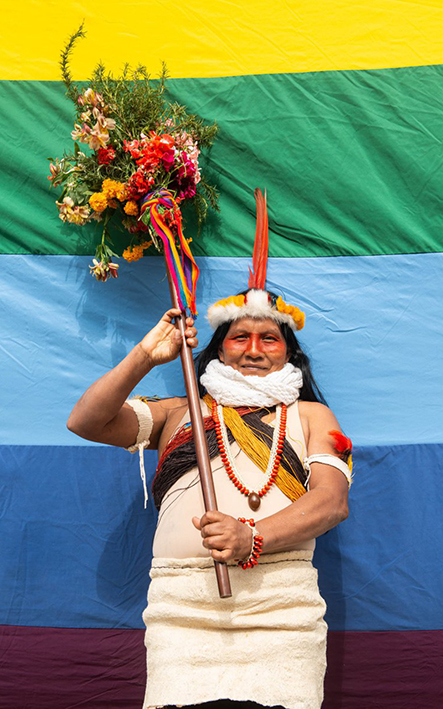
Photo: Alicia Cahuiya, Waorani leader. Head of Women and Family at Conaie. Cochapamba – Ecuador (2021). Carolina Zambrano.
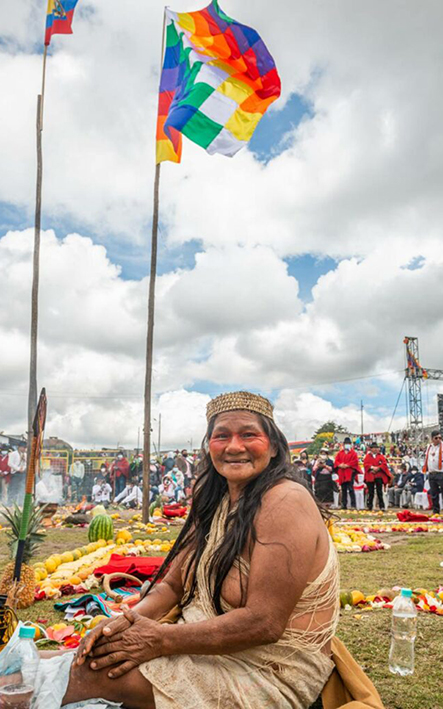
Photo: Huica Iteca, one of the Waorani women who came from the Ñoneno community to support Alicia Cahuiya in the new leadership. Cochapamba – Ecuador (2021). Carolina Zambrano.
Her aunt Huica accompanied her to the celebration together with other Waorani. Nanto was by her side, offering his support at that historic moment. Alicia clasped her companions’ hands and raised them in victory.
As the leader of Conaie, Alicia Cahuiya plans to train more women on rights to eradicate gender violence in the communities. She will continue to support and take part in the processes to strengthen indigenous female leaderships in Ecuador and the South American Amazon.
She will have to continue her arduous struggle in a hostile context for indigenous people, with a state that intends to expand oil exploitation in Yasuní. The government. led by the banker Guillermo Lasso (who took office in May 2021), has already announced a planned increase in daily oil production from 500,000 to one million barrels of oil (bopd).
The plan to expand the oil frontier is already underway, which is why Alicia Cahuiya’s struggle is more topical than ever. Satellite images show the opening of a 4.7 km road in Block 43 that crosses the Yasuní park and connects the B and C Tambococha rig to the A and B Ishpingo rig. This has happened despite the continuing traces of the 15,800-oil barrel spill—which occurred on April 7, 2020—affecting Waorani families and other peoples who depend on the Napo and Coca rivers. The 25,000 families affected are still waiting for justice.
After the children from Cotopaxi finished singing their song in kichwa, which formed part of her inaugural ceremony as a senior official-Alicia’s questioning of the government authorities could be heard more clearly: ”Where will the children live?”
She claims that the government allows and facilitates the depredation of one of the rainforests with the greatest biodiversity. “The government must understand that the rainforest is not an empty territory; it is not a commodity,” declared Alicia solemnly, demanding, once again, “Let us live as Waorani!”
This report is part of the Defenders of the Territory project sponsored by Climate Tracker and FES Transformacion.
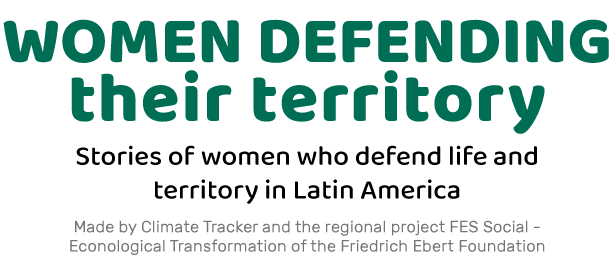




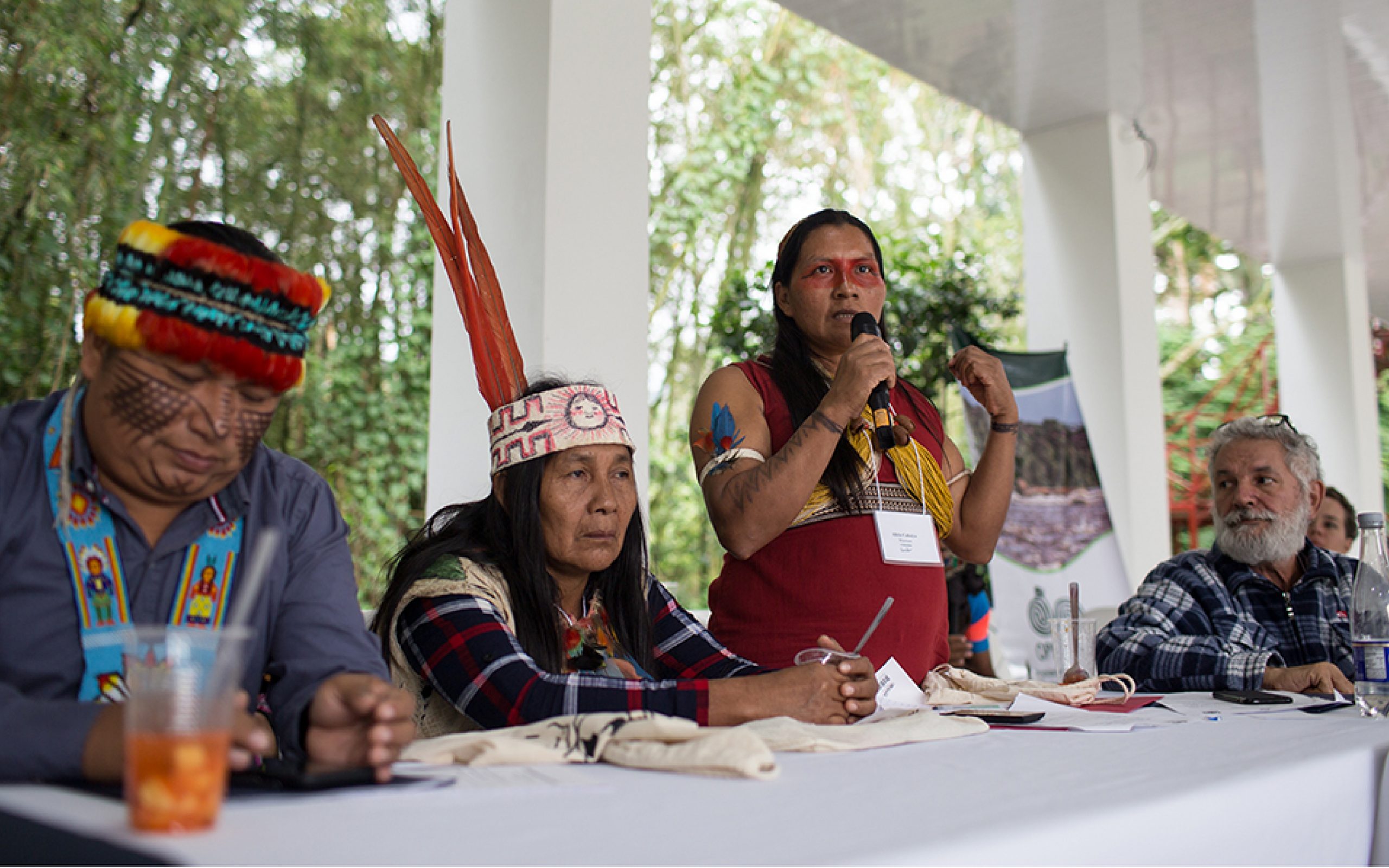
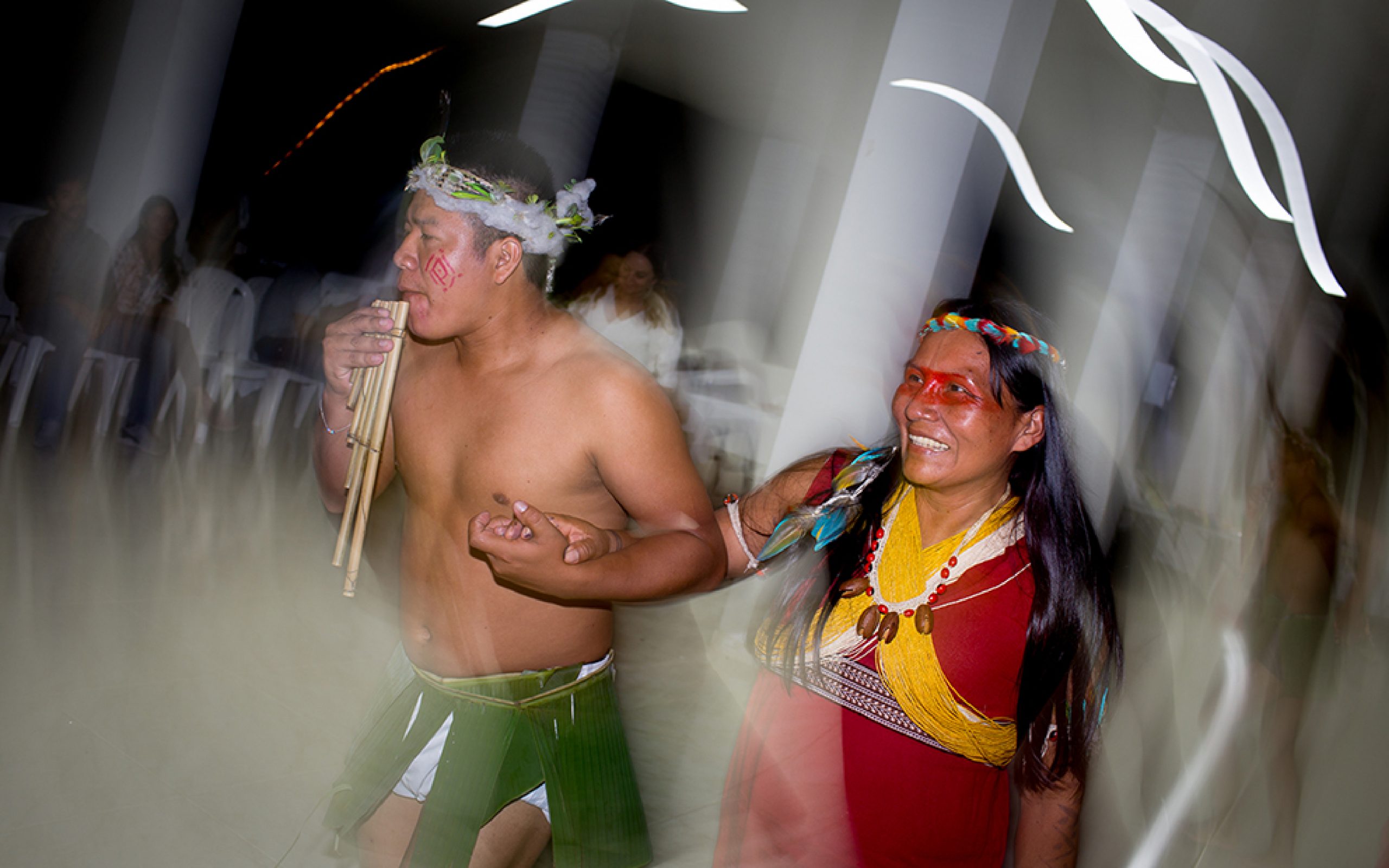







Leave a Reply